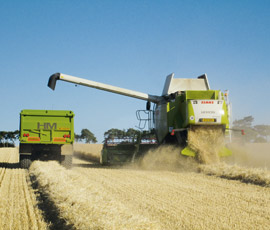Low expectations exceeded by early harvest as storms loom

Early yields from the first winter barley crops are fuelling optimism, especially as the harvest appeared to promise so little earlier in the year.
Reports have rolled in from across the country of early varieties being combined, with yields averaging about 7-7.5t/ha.
The bulk of the winter barley harvest is set to really get going next week across most of southern and central England with quality looking good – although there is some concern over recent storms.
James Mills, NFU combinable crops adviser, says grain quality looks to be one of the most promising aspects, even if the quantity isn’t quite there.
“If you roll the clock back to January/February time, people were pretty despondent about what the harvest was going to offer. But I think, particularly on the quality side of things, they are now a lot more optimistic,” he says.
“Although you will never get the full picture on what we can expect from harvest early on, as the earlier crops typically yield slightly less, reports so far are positive,” he adds.
Chris Ascroft at Wilbraham Farms, Cambridgeshire, was also able to get going earlier than most. He started on 18 July and has so far harvested 120ha of his winter barley.
His crop of Venture was coming in at a moisture of 10.9% and yielding between 6.8t/ha and 7.2t/ha with a specific weight of 70kg/hl.
Mr Ascroft, who farms between Cambridge and Newmarket, says he is a little disappointed with the yield following a more promising looking crop a few weeks ago.
“I think the hot weather has accelerated it – quicker than it should, really – but it’s combining well,” he says.
The September-sown crop looked in good condition all year, according to Mr Ascroft, who admits he is harvesting it sooner than expected.
“Two weeks ago I would have said we were still a few weeks away, but over the past week it has changed dramatically,” he says.
Pre-empting field damage
Further east near Bury St Edmunds, organic farmer John Pawsey has harvested more than 50ha of his Suzuka winter barley.
With the change in weather, Mr Pawsey has taken the decision to get as much harvested as possible in order to prevent any damage in the field.
“Yields are so far looking better than last year. We also have some Flagon malting barley; we don’t know if it will be malting or feed, we will wait for the quality first,” he says.
“Specific weight is 70kg/hl-plus in the barley and looking much better than last year so quality is looking good,” Mr Pawsey adds.
Further west, close to the Welsh border, Neville Bartlett has started harvesting on Bridge View Farm, near Chepstow.
The crop of California winter barley was yielding about 7.4t/ha and coming in at 15.6% moisture with the added bonus of copious amounts of straw in a livestock area.
The optimism of this year has also been seen further south where one grower in Dorset, close to Blandford Forum, has seen the brewers’ old favourite variety Maris Otter yielding more than 6t/ha.
“We didn’t drill it until early November, so we’re very happy with the yields,” he says.
“There are some green bits and some very ripe bits so we are cutting at about 17% at the moment, but, hopefully, we should get most of the [162ha] of winter barley done this week,” he adds.
In Devon, reports of Venture winter barley coming off at 12% moisture and a 7.5t/ha yield at Fortescue Farm near Exeter have continued the positive start to the harvest.
Further north there was little sign of harvesting reported in Lincolnshire, with the first winter barley crops looking close to being cut by the weekend.
“Generally crops look pretty good, and we are likely to see harvesting towards the end of the week once crops dry out after the recent rain,” said Christine Lilly, technical manager at adviser Frontier.
She reported some winter wheat on light land was starting to struggle with patches of yellow showing through, but recent rain has given some relief to these drought-stressed crops.
Sentry on alert
Meanwhile one of Britain’s biggest farming groups, Sentry, is set to start combining winter barley at the weekend on one of its farms on sandy loam soils in west Norfolk where a few neighbouring fields have already been cut.
“We hope to start by the end of the week. As soon as the rain stops and it dries up, the combines should start,” says group farm business adviser John Hall.
Sentry farms about 50,000ha of predominantly arable land stretching from south Dorset to mid-Scotland.
Despite the positive start there are still concerns of the recent weather causing damage to the crops.
The longest heatwave in more than seven years has caused wheat crops on lighter land to miss out on the vital grain filling period according to Strutt & Parker agronomist Ryan Hudson.
“Some crops have only got grain half formed and with the exceptionally hot weather we won’t get the full grain fill, so may see a slight dip in yield,” he says.
Coupled with this, Mr Mills at the NFU says the recent thunderstorms are also a cause for concern and may have an effect on some crops.
The main worry is the impact on quality – and certainly at the moment the quality of the crops is what people are holding out for, says Mr Mills.
“People have been spraying both their barley and oilseed rape and there is the risk of lodging but hopefully the damage will be minimal.”
Fears heatwave will dent wheat yields on lighter land

